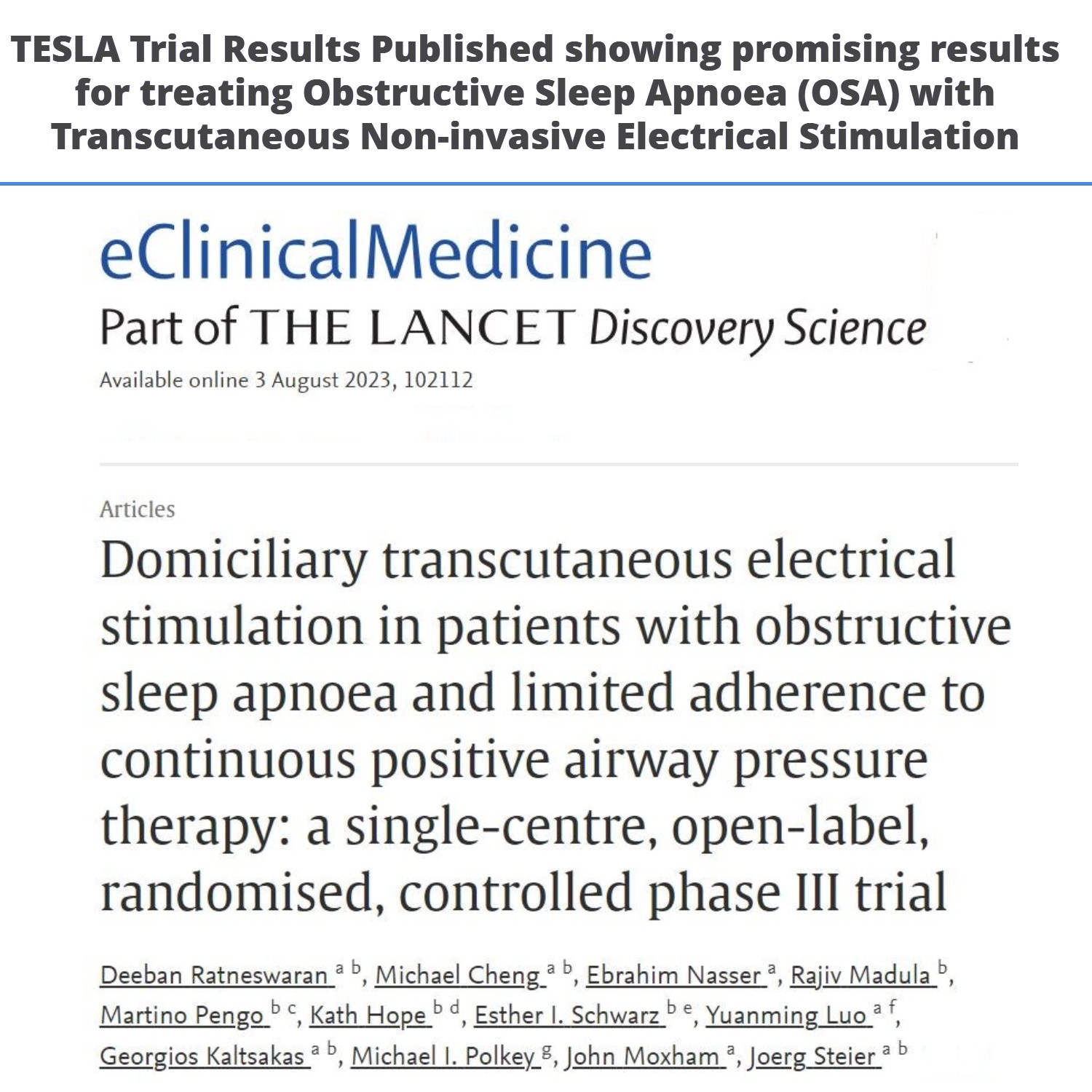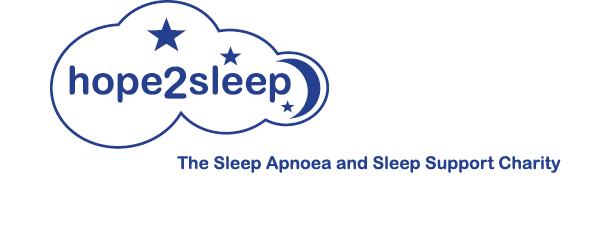TESLA Trial Results Published for Non-invasive Electrical Stimulation for Obstructive Sleep Apnoea (OSA)
5 Comments7 August 2023 | Kath Hope

Firstly, with regards to the positive developments, we're delighted to announce the published TESLA trial results. We want to thank everyone who volunteered to participate in the trial, as without you, it wouldn't have been possible. So, thanks to everyone who took part ❤️
The trial demonstrated the potential benefits of transcutaneous electrical stimulation amongst a very carefully selected group of patients with regular monitoring. Nevertheless, it is critical to emphasise the importance for patients diagnosed with sleep apnoea to consult their physicians when choosing a treatment. The correct treatment selection is crucial due to the significant medical risks associated with sleep apnoea. This is why the researchers have kindly provided us with a statement to help with any questions or confusion below.
Statement from the Researchers on the TESLA Trial regarding the Use of Electrical Stimulation for Obstruction Sleep Apnoea (OSA)
Re: Domiciliary transcutaneous electrical stimulation in patients with obstructive sleep apnoea and limited adherence to continuous positive airway pressure therapy: a single-centre, open-label, randomised, controlled phase III trial
Published: August 03, 2023
DOI: https://www.thelancet.com/journals/eclinm/article/PIIS2589-5370(23)00289-4/fulltext
Thank you for your interest in the TESLA trial1, conducted jointly by King’s College London and Guy’s and St Thomas’ Hospital, led by Dr Ratneswaran and Professor Steier on behalf of the TESLA investigator group.
While the study highlights the potential benefits of transcutaneous electrical stimulation in obstructive sleep apnoea (OSA), it needs to be emphasised that CPAP remains the evidence-based standard for the majority of patients with OSA.
Non-CPAP therapeutic options exists for those who do not tolerate CPAP, and there is evolving early evidence as published in the guidelines by the European Respiratory Society (ERS, Randerath et al, Eur Resp Rev 2021). However, most non-CPAP therapies are not as efficient as CPAP therapy, and it is therefore essential to consult with your physician before discontinuing any current treatment, or considering to change.
The evidence for electrical stimulation for the treatment of OSA (hypoglossal nerve stimulation) has been evolving over the last decade2,3. While surgically implantable electrical stimulators have already been approved by the NHS and other healthcare systems, the current trial investigated for the first time the use of transcutaneous electrical neurostimulation (TENS) as a potential alternative.
Key findings and comments:
- Who is it for? The study analysed a selected group of patients who were anticipated to respond well to this treatment, and who did not use CPAP therapy sufficiently - this included individuals who were less obese and with OSA, as defined by an apnoea-hypopnoea index (AHI) between 5-35 events/hour. This patient type had been identified in a previous trial (Pengo et al, Thorax 2016) as being more likely to benefit with a clinical response.
- What device was used? The method was applied using a TENS machine. This was done under rigorous monitoring conditions, including current titration trials, adherence, follow up and education about placement of the patches. An informed supervision by a sleep centre that has diagnostic means to check on the treatment success remains important, and, thus, the current method is not suitable for general unsupervised use.
- Self-Medication Warning: Based on our findings, patients should not attempt to “self-medicate” using TENS. The initial setup is complex and supports a narrow therapeutic range, patient setup, supervision, and the use of specific current parameters (e.g., frequency, intensity, waveshape). However, we would encourage eligible patients to consider participating in upcoming multi-centre randomised controlled trials using this and similar methods.
- Previous Results: Whilst our current research highlighted some promising data, it is important to acknowledge that past trials found the treatment ineffective for many patients who are non-responders.
- Considerations: Treatment adherence, lifestyle adjustments, correct patch placement, and consistent patient-doctor communication, especially regarding issues and current titration, are essential for effectiveness. Therefore, close monitoring is required, as the use of a TENS machine has significant limitations.
- Next Steps: New devices using the method are currently being developed to overcome many of the above issues . These devices will be investigated in upcoming multi-centre trials.
Dr. Deeban Ratneswaran, the first author of the reported trial, commented on the study findings: "While the results are promising, it is essential to highlight the specific conditions of our study. The success of the method depends heavily on the selection of responders, education of the patient, and the meticulous management of the therapeutic settings. Our study sheds light on the potential and the acceptability of using TESLA in a home setting, and a broader multi-centre trial will be required to further validate its applicability. We strongly advise patients to consult their healthcare providers before considering new treatment modalities, and to continue with their current established treatment for the meantime."
References:
- Deeban Ratneswaran, Ahmad Guni, Martino F. Pengo, Miral Al-Sherif, Baiting He, Michael CF Cheng, Joerg Steier, and Esther I. Schwarz. "Electrical stimulation as a therapeutic approach in obstructive sleep apnea—a meta-analysis." Sleep and breathing 25 (2021): 207-218.
- Deeban Ratneswaran, Michael Cheng, Ebrahim Nasser, Rajiv Madula, Martino Pengo, Kath Hope, Yuanming Luo, Georgios Kaltsakas, Michael I. Polkey, John Moxham, Joerg Steier. Domiciliary transcutaneous electrical stimulation in patients with obstructive sleep apnoea and limited adherence to continuous positive airway pressure therapy: a single-centre, open-label, randomised, controlled phase III trial – EClinicalMedicine
- Pengo, Martino F., Sichang Xiao, Culadeeban Ratneswaran, Kate Reed, Nimish Shah, Tao Chen, Abdel Douiri et al. "Randomised sham-controlled trial of transcutaneous electrical stimulation in obstructive sleep apnoea." Thorax 71, no. 10 (2016): 923-931
Q&A on the TESLA Trial and TENS Treatment for Sleep Apnoea
Q1: What was the TESLA trial about?
A: The TESLA trial was a study by King’s College London and Guy’s and St Thomas’ Hospital to explore if electrical stimulation applied via the skin to target the tongue and upper airway could help those with sleep apnoea who were non-adherent to PAP therapy. Electrical stimulation was applied using a TENS machine.
Q2: Who were the participants in this study?
A: Based on previous studies, the study focused on a specific group: those with a body mass index up to 32 kg/m2, and those with and AHI of 5-35 events/hour. Unselected patients are less likely to respond.
Q3: How was the TENS machine used in the study?
A: Doctors in the study carefully monitored the use of the TENS machine, including its power settings, stimulation frequency, correct titration and usage, and ensuring the patches were applied correctly. This ensured that the treatment was as effective and safe as possible.
Q4: Can I use TENS for my sleep apnoea at home?
A: The study does not currently recommend using a TENS machine for sleep apnoea at home. However, the study adds to the evidence suggesting that electrical stimulation through the skin can help a selected cohort of patients with OSA.
Q5: What were the key results of the study?
A: The findings are promising, but the TENS machine was not effective for everyone. The success of the treatment varied based on several factors, such as age, weight, body mass index, the severity of OSA, and other health-related factors.
Q6: What are the next steps after this study?
A: New devices are currently being developed to address some challenges observed in the current study, and to provide user friendly surfaces. The results of the current trial will be further considered to assess suitability of the method in specific healthcare settings in larger trials, analysing patients from different centres.
Q7: Where can I find more details about the TESLA trial and its findings?
A: For a detailed understanding, you can refer to published articles in "EClinicalMedicine", which provide you with more information and background of the trial.
https://www.thelancet.com/journals/eclinm/article/PIIS2589-5370(23)00289-4/fulltext












I believe that I meet the criteria for future trials and would be eager to participate. I find CPAP difficult to tolerate, due to eye issues & severe dry mouth problems, despite using a humidifier.
Hi Geoff. Sorry to hear you're struggling and please do ask for her in our Private Support Group or contact us. Also speak with your clinic. If there are any future opportunities to participate in trials we'll be letting everyone know via our newsletters.
Sorry Geoff I meant ask for 'help' not her